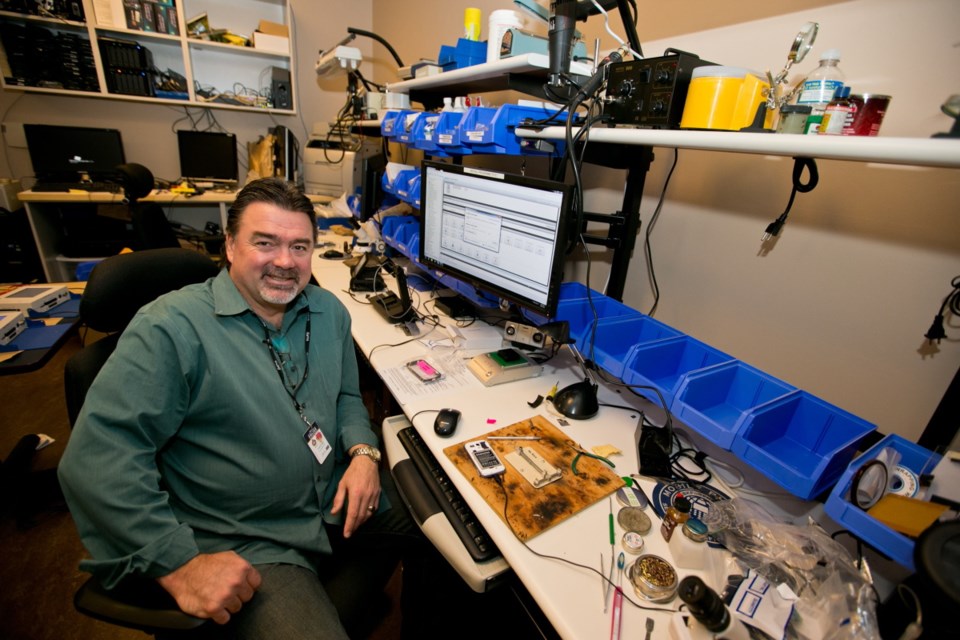In Bob Elder’s expert hands, a cellphone is a gold mine of crime-fighting information.
Elder recently retired from his job as a detective-constable with the Victoria Police Department. His last seven years on the force were spent with the Computer Forensic Unit, honing his ability to pull data from electronic devices.
The 51-year-old has developed such a knack for what he does that his knowledge is sought around the world — the result of a reputation gained from a regular travel schedule to teach his techniques to other professionals. As a result, he is often asked to weigh in on cases from far afield.
“I just did work on a homicide in Delaware,” Elder said, explaining that the case involved a man who killed his wife but claimed to have found her dead in the house.
“Based on using one of these advanced techniques, we were able to determine that he had actually been Googling the event from the time he killed her to the time it was reported to police. In that hour, he was Googling it to see if it had been reported, so that put him at the scene.”
Elder’s work has also meant dealing with child-pornography cases, including an investigation of a Victoria juvenile that took on international proportions. The juvenile turned out to be trading child pornography with people around the world, and Elder and others were able to delve into the operation by extracting chat logs and contact lists from a hard drive.
That led to a string of arrests in other locations over the next three or four years and the rescue of a number of children. Elder said the success and scope of the outcome makes it stand out among his cases.
Elder’s police career includes eight years as a Saanich reserve officer and 131Ú2 years with VicPD — time that also included a stint with the Strike Force, an undercover surveillance squad focused on drug cases. He said he jumped at the chance to work in computer forensics.
“I was always a geek from way back, so when the job came up to become part of the unit, I applied for it and got it.”
Elder’s role in cellphone-related investigations usually involves getting into the guts of the device, taking it apart and looking for data. He said criminals may lock their phones, but that won’t stop police.
“That’s where my expertise kind of comes in,” Elder said. “I deal mainly with the advanced mobile forensics at what we call the physical level, so I’m dealing with the actual memory chips on the [circuit] board as opposed to the device itself.”
Much of Elder’s knowledge has come from work done on his own time, and the results are considered groundbreaking, said Victoria police spokesman Bowen Osoko.
“I just had a passion for it,” Elder said.
Life beyond police work will involve transferring his skills to the private sector with Teel Technologies, an American mobile-device forensics company expanding into Canada. Elder will head up the company’s Canadian operations.
His new job will change his travel itinerary, which was previously confined to North America.
“Starting in June and July, I start teaching in the U.K., Germany, Brunei and other countries. All of these countries now are looking for that technology to be able to get into these phones.”
Following wider trends, police have been looking at fewer and fewer computers, and considerably more mobile devices, Elder said. Victoria police examine about 300 cellphones a year, he said.
“The trend is within five to seven years, they expect people won’t have computer towers in their house. It’ll all be smartphones or tablets, that kind of thing.”
Information gleaned from cellphones fits in well with the legal process, Elder said
“Things that we can find on them would include call logs, contacts, text messaging. Some of the cellphones now can hold up to 3,000 or 4,000 text messages, so that gives us pretty good evidence toward the file,” he said.
“If it’s a drug dealer and he’s got a thousand text messages, arranging buys and all of that kind of stuff, it’s really conclusive evidence when we take that to court.”
Elder’s retirement was accompanied by a Commendation for Meritorious Service from Victoria Police Chief Jamie Graham.



